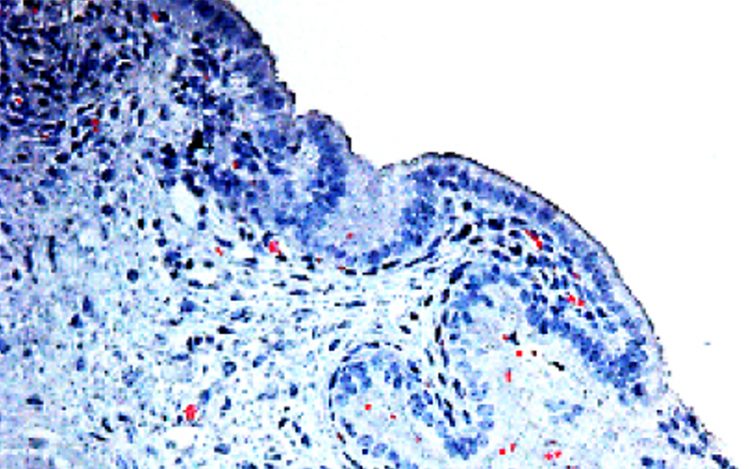Therapy of preterm birth in sight?

PIF (red) acts in the placenta (blue) against inflammatory response (microscopic view, Department of Gynaecology and Obstetrics) Inselspital, Bern University Hospital
Inflammatory response during pregnancy is the leading cause of preterm loss. Depending on its degree, it may also lead to preterm birth. A team of researchers from Bern and Rome in cooperation with BioIncept Inc. found that a synthetic version of the PreImplantation Factor (PIF), endogenously present in viable embryos, reduces the inflammatory response during pregnancy. The study results were published in the June 12 issue of PLOS One.
“PIF modulates key elements of the inflammatory pathway namely the inflammasome complex,” explains corresponding author PD Dr. Martin Mueller, Senior Attending in the Department of Gynaecology and Obstetrics at Inselspital, Bern University Hospital, and Visiting Assistant Professor in the Department of Obstetrics, Gynaecology and Reproductive Sciences at Yale School of Medicine. “This mechanism is the first to allow influencing inflammatory response during pregnancy.”
Using a model, Mueller and the team found that PIF reduces foetal loss, reverses the inflammatory response and improves fetal growth. A series of clinically relevant in vivo and in vitro experiments demonstrated that PIF modulates the inflammasome complex in the placenta.
Lead author Nicoletta Di Simone, Professor in the Department of Obstetrics and Gynaecology at Università Cattolica Del Sacro Cuore in Rome, was astonished at the results: “In summary, our findings suggest that PIF protects the pregnancy against an inflammatory insult.”
“This novel pathway is promising and encourages us to pursue this new line of investigation,” said co-author Dr. Daniel Surbek, Professor and Head of the Department of Gynaecology and Obstetrics and feto-maternal medicine at Inselspital. “Given the common inflammatory origin of fetal loss and preterm birth, we may even have a new powerful treatment to prevent both,” he says.
PIF was first discovered and characterized by Eytan Barnea, founder of the Society for the Investigation of Early Pregnancy (SIEP) and chief scientific officer at BioIncept, LLC. Based on his data, the FDA has awarded PIF fast-track designation, resulting in a recently completed first clinical trial to treat patients with autoimmune liver disease at the University of Miami.
In Bern, the research team is now evaluating the possibility of a clinical trial with pregnant subjects. The goal would be to use PIF prophylactically to prevent preterm birth in high-risk pregnancies.
Contact:
PD Dr. Dr. med. Martin Müller, Senior Attending in the Department of Gynaecology and Obstetrics at Inselspital, Bern University Hospital, contact via kommunikation@insel.ch, +41 31 632 79 25.
http://journals.plos.org/plosone/article?id=10.1371/journal.pone.0180642
Media Contact
More Information:
http://www.insel.chAll latest news from the category: Health and Medicine
This subject area encompasses research and studies in the field of human medicine.
Among the wide-ranging list of topics covered here are anesthesiology, anatomy, surgery, human genetics, hygiene and environmental medicine, internal medicine, neurology, pharmacology, physiology, urology and dental medicine.
Newest articles

NASA: Mystery of life’s handedness deepens
The mystery of why life uses molecules with specific orientations has deepened with a NASA-funded discovery that RNA — a key molecule thought to have potentially held the instructions for…

What are the effects of historic lithium mining on water quality?
Study reveals low levels of common contaminants but high levels of other elements in waters associated with an abandoned lithium mine. Lithium ore and mining waste from a historic lithium…

Quantum-inspired design boosts efficiency of heat-to-electricity conversion
Rice engineers take unconventional route to improving thermophotovoltaic systems. Researchers at Rice University have found a new way to improve a key element of thermophotovoltaic (TPV) systems, which convert heat…



